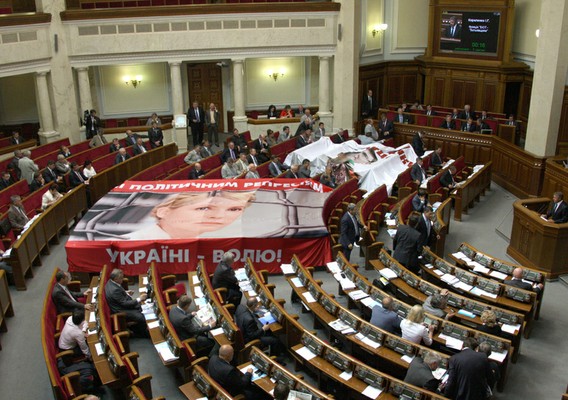Release of former Prime Minister to allow her to recover in Germany is increasingly less likely. So one of the key conditions to conclude negotiations with the European Union is passed over and instead becomes the hypothesis of a customs union between Kiev and Moscow
No hospitalization abroad for Yulia Timoshenko. The Rada, the Ukrainian parliament, has rejected all six proposed laws that would allow early release of the opposition leader, simultaneously interrupting negotiations for signing an association agreement with the EU. By decree, the Ukrainian government, led by Prime Minister Mykola Azarov, has officially decided to suspend the preparation of the agreement to “ensure national security, boost economic relations with Russia and prepare the internal market for parity relations with the European Union.” The signing of the association agreement between Kiev and the European Union had been scheduled for the planned summit in Vilnius on November 28-29th.
To open the agreement, the EU had asked Ukraine to make progress in reforms in justice and electoral laws but especially to release former Ukrainian Prime, Minister Yulia Timoshenko, to enable her to undergo treatment in Germany. Her health has indeed been in quite precarious condition for some time also because of harsh conditions in detention. On Thursday however the Ukrainian government permanently closed dialogues with the EU, rejecting the Tymoshenko law, suspending the association agreement with the EU and opening, in fact, the doors to the Kremlin and the finalization of a possible customs union with Russia.
Several days ago the Ukrainian Parliament had already decided to postpone the debate until yesterday, revealing clear difficulties in reaching a compromise. The EU observers, Pat Cox and Aleksander Kwasniewski, are still in Kiev to finalize a report for submission to the European Commission. In the coming days, the Enlargement Commissioner, Štefan Füle, will return to Ukraine so as not to interrupt the dialogue with the Kiev government, even though the games seem to have already been decided.
The Commission was puzzled by head on questions from journalists regarding what the EU’s next move will be in the light of the facts that emerged Thursday morning. “We’re not going to comment on hypothetical scenarios yet. However we anxiously await the results from our observers in Kiev in order to have a clear idea of what is going on,” says Peter Stano, spokesman for Commissioner Füle. Stano also pointed out that “in any case it is the member states’ responsibility to decide.” Shortly before the official report of the agreement suspension between the EU and Ukraine, Hannes Swoboda (Socialists & Democrats), had invited the two sides to get together to qualify the potential of the association agreement for both. The European Parliament MEP and leader of the S&D feels,” Moscow’s continuing attempt to blackmail Ukraine and other countries is deplorable.”
Marco Frisone




![La presidente della Bce, Christine Lagarde, in conferenza stampa [Francoforte, 6 marzo 2025]](https://www.eunews.it/wp-content/uploads/2025/03/lagarde-tassi-250306-120x86.png)


